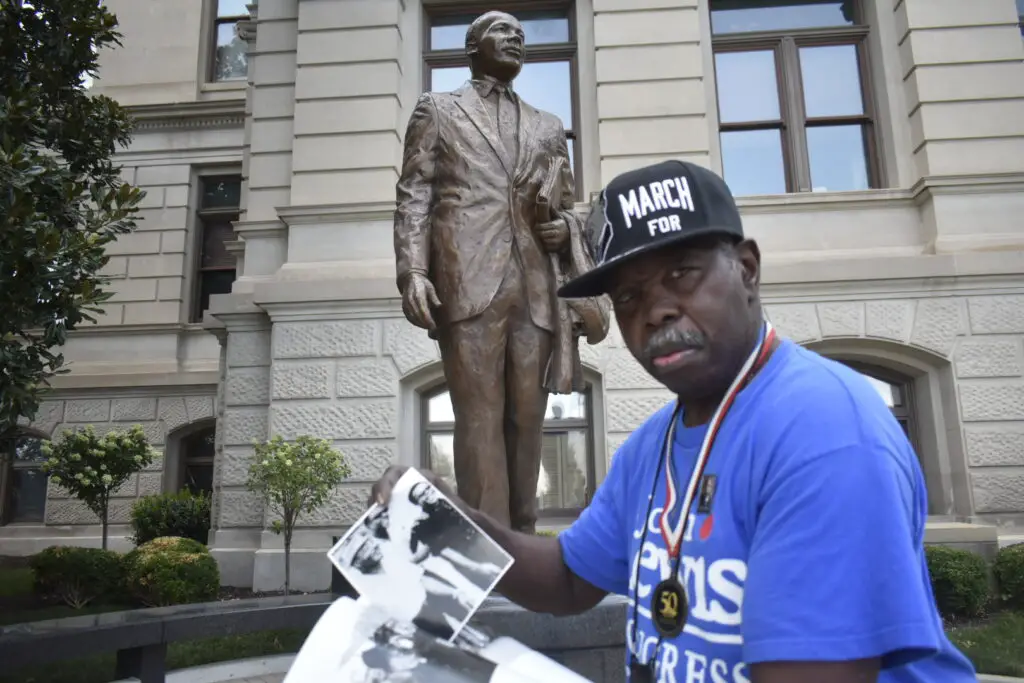Nearly thirteen years ago, Larry Platt, dubbed the “General,” shook up the TV world, becoming an “American Idol” sensation at 64 years old with his song “Pants on the Ground,” but many do not know there is more to his story.
Decades before his viral performance, Georgia’s most famous pants puller-upper championed a much different and decidedly more historic cause: He served as a foot soldier fighting for civil rights alongside luminaries like Martin Luther King Jr., John Lewis and Hosea Williams, who Platt says gave him his nickname.
Platt’s activism earned him an official commendation from Gov. Brian Kemp, who, in 2021, called Platt an “outstanding Georgian and American hero” because of his participation in civil rights protests across the South. The same year, Kemp signed a resolution naming several roads and bridges after notable Georgians, including the General Larry Platt bridge on State Route 166 in Fulton County. Gov. Brian Kemp, “General” Larry Platt and First Lady Marty Kemp share a laugh in the governor’s office after Kemp signed a proclamation honoring Platt. Via Brian Kemp Twitter @GovKemp
Atlanta Democratic Rep. Park Cannon sponsored the resolution that led to the bridge’s naming. Like many others, she first heard about Platt through his performance on TV, but she said she later met him and was inspired by his story.
“My heart was just pouring out when I met him, you know? And I wanted to really hear his story,” she said. “And, you know, a lot of the sentiment that I got from him was just that bad things happened to him and no one cared. So my goal was to have a good thing happen to show that Georgia does care for him.”
Cannon and an intern also created a history of Platt’s life.
“I really wanted his oral history to live on,” she said.
Looking back on his memorable audition, Platt remembered Idol producers trying to discourage him from going in front of the judges and millions of American viewers because he was past the show’s age limit, which cuts off after 28.
But Platt is not one to take no for an answer, said his wife, Sally Harley.
“We felt like the world needed to hear that song,” she said. “You see so many people going around with their pants on the ground, and that don’t look good. I thought about making one myself about the women who go around with the Daisy Dukes on.”
Platt and Harley have been together for more than three decades, and it was she who convinced him to sign up for the competition.
“I have a horrible feeling that song could be a hit,” Idol judge Simon Cowell said at the time.
Attitude aside, Cowell was correct. “Pants on the Ground” peaked at No. 46 on the Billboard top 100 the week of Feb. 27, 2010 (No. 1 that week was Ke$ha’s “TiK ToK.”). Platt went on to perform the song for the Grammy’s live pre-show, and writer/director Tyler Perry sang it dressed as his popular Madea character in his play “Madea’s Big Happy Family.”
“I told Larry the next day everybody’s gonna be talking about you. No matter what those producers say, he’s gonna make it,” Harley said. “And sure enough he blew up the next day.”
Harley said her husband’s dedication to his anti-sagging campaign demonstrates the same steadfastness he put to work through the labors of the Civil Rights Movement in the ‘60s. Singer and Civil Rights activist “General” Larry Platt shares photos and stories next to a statue of Martin Luther King Jr. at the Georgia Capitol. Ross Williams/Georgia Recorder
And prior to his activism, Platt survived a number of traumatic experiences growing up in the segregated South.
At the age of three, he was shot in the eye by a member of the Ku Klux Klan near his Atlanta home. It was a time of racial tension as members of the Black community protested for the right to vote.
“My older sister came and took me across the street at age three years old, that’s when the Ku Klux Klan shot me in my right eye with a BB gun,” Platt said. “I had to go to the old Grady hospital to take the BB out of my eye. And at the age of nine-years-old, I had to get another operation on my eye.” “General” Larry Platt shows a collage of photos from the Civil Rights era. Ross Williams/Georgia Recorder
His run-ins with the Klan persisted throughout his young adulthood as he became more involved with civil rights protests when he was 18.
Platt was among the hundreds who marched across the Edmund Pettus Bridge in Selma, Alabama, on the infamous day in 1965 referred to as “Bloody Sunday,” when Alabama state troopers brutally attacked voting rights demonstrators.
Platt said though the bus ride to Alabama was long, the multi-racial group of protesters passed the time by singing songs of the Civil Rights Movement, such as “We Shall Overcome,” to stay motivated in their fight for equality.
“We were singing different songs and we really didn’t go by the color of skin. We had peace. There was no such thing as different color of skin. We all sat as one,” Platt said.
Platt held onto the message of peace as the fight for equality grew more hostile.
“We marched for peace and (Alabama State Troopers Maj.) John Cloud didn’t want peace. We marched from Selma to Montgomery, but we marched for peace,” Platt said. “We got all bloodied up.”
Now 76, Platt’s body still bears scars from wounds incurred in his youth, but Platt continued his work as a foot soldier in the movement, going on to participate in the August 1963 March on Washington, where Martin Luther King delivered his groundbreaking “I Have a Dream” speech.
“We put our feet in the cold water because it was hot. And I remember Dr. King up there by Abraham Lincoln and he hit the (podium). Boom! Saying ‘I have a dream.’”
Platt said those words have stuck with him as he continues to do his part to spread the message of peace.
Platt visited the Capitol last month with hundreds of others to say goodbye to King’s sister, Christine King Farris as she lay in state. Carrying a bag of photos, news clippings and other items from back in the day, Platt gave his condolences to old friends and reminisced about the work he did.
Unsung heroes
The American Idol sensation is only one out of thousands of unknown freedom fighters who were crucial to mobilizing the cause. However, Platt and his wife said he and others deserve better recognition.
“Larry really never got any recognition the way that he was supposed to get it,” Harley said. “If it weren’t for people like the foot soldiers, Dr. King wouldn’t have gotten where he was.”
Crystal Sanders, associate professor of African American Studies at Emory University, said that it is easy to spotlight the charismatic leaders of the civil rights era, but there were always volunteers who gave their time, talent and oftentimes sacrificed their lives just to fundraise and organize protests.
Sanders said there are many overlooked people and organizations, such as the Club From Nowhere that helped fund the Montgomery Bus Boycott through food sales, that were part of the pool of unknown figures who were doing the groundwork.
“For every single landmark event in the movement, whether we’re talking about the Montgomery Bus Boycott, the marches from Selma to Montgomery, the 1963 march on Washington, there are people behind the scenes making things happen,” Sanders said. “They are raising money, they’re talking about logistics, ensured that there are first aid stations.”
Platt says he did not get rich off of his time in the spotlight, but as he approaches his 77th year of life this month, he and Harley often reflect on issues that continue to plague the Black community.
Sanders said many of the socio-economic disparities that people of color are experiencing in the 21st century can be directly traced back to segregation and the era of Jim Crow laws.
“We know that it’s very hard for Black and brown people to live in communities where they have access to fresh fruits and vegetables. We know that it’s hard for people of color to be taken seriously when they go to see a health care provider,” Sanders said.
Today, Platt and his wife continue to do what they can to carry on the traditions of the movement by doing things to uplift the community from time to time like giving away free meals and donating clothes to their neighbors.
But even though his groundwork in the movement may seem overshadowed by his 15 minutes of fame, Platt said he is proud of the song that made him a legend in his own right.
SUPPORT NEWS YOU TRUST.
DONATE
Georgia Recorder is part of States Newsroom, a network of news bureaus supported by grants and a coalition of donors as a 501c(3) public charity. Georgia Recorder maintains editorial independence. Contact Editor John McCosh for questions: info@georgiarecorder.com. Follow Georgia Recorder on Facebook and Twitter.
Disclosure: This article may contain affiliate links, meaning we could earn a commission if you make a purchase through these links.






